Richard Swan's Blog, page 4
October 29, 2022
Empire of the Wolf Update 30/10/22
Time for a monthly update methinks.
The Justice of Kings
Nothing to report on this; it continues to be available for sale in multiple formats in multiple countries in multiple outlets. Neat!
The Tyranny of Faith
The cover has been revealed!
The inimitable Petrik Leo was tasked with the official reveal of this one (and you can find his post over here on Novel Notions: https://novelnotions.net/2022/10/17/cover-reveal-the-tyranny-of-faith-empire-of-the-wolf-2-by-richard-swan)
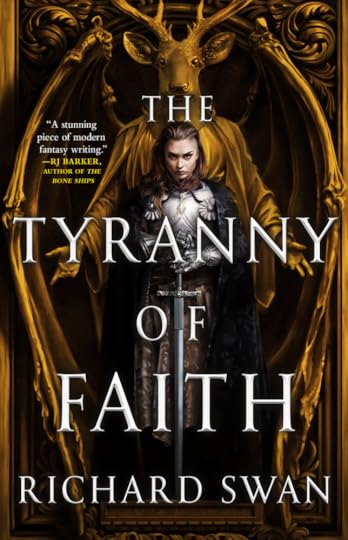
This is an exquisite, stunning piece (as we’ve all come to expect) from Martina Fačková. I’m so thrilled with it. I think she’s captured Helena perfectly (note the detail of the shaved side of the head after the wound she suffered in Galen’s Vale). Plus the spooky pagan demon has such a wonderful, dark, satanic feel to it.
TToF will be released in hardcover on 14 February 2023. It'll be going up on Netgalley a few months in advance of this (and some lucky reviewers will be shipped early finished hardcovers as well).
TToF can be pre-ordered in a great many places. Pre-orders help authors gigantically so if you are planning on purchasing the book at some point please consider pre-ordering it. Here are some links to the larger chains, but please always support your local independent bookstore wherever you can:
Please note that each Hachette site provides links to other stores (B&N, iBooks, etc.)
I have some interviews and readings in the coming weeks and months which I’ll be sure to link here.
Empire of the Wolf Book 3
I finished my first pass edit of this a week or so ago, which incorporated the feedback of my (in this case, solitary- thanks, George) beta reader. This has now gone in to my editor for the formal editorial review, though thanks to his/their general overbookedness, won’t be looked at until January 2023. Still, it’s not due to be released until Feb 2024, so we have a bit of time…
I really like where this one came out. There’s a lot of fighting in this one, as we’d expect from the culmination of a trilogy, and so I was at pains to temper that with a good amount of philosophical ruminations. That’s right: I am going to teach you jurisprudence whether you like it or not. Lots of afterlife stuff here too, more than books 1 and 2 combined. Plus we also get to visit the Kasar Kyarai (that’s the land of the wolfmen) for a good 5 or 6 chapters.
No idea how this will fare in the editorial process, nor will I find out until probably Feb.
Convention appearances
For those of you Australia based, I’ll be in the Literary Legends booth at Supanova Brisbane (5-6 November) and Adelaide (12-13 November). I’ll be selling, signing and panelling on both days of both weekends so if you’re about come and say hello!
I am also planning on attending one convention in the States next year (successful guest application pending) and I will also be at Worldcon in Glasgow 2024. So lots of opportunities to meet coming up!
Other Writing Projects
Working on a couple of things at the moment whilst book 3 is away for edits. The first is a potential follow on trilogy to Empire of the Wolf set several hundred years later and I am deep, deep, DEEP into updating the map for that, which has just been so much fun (I would post my progress but the spoilers for EOTW would be insane). Flintlock fantasy with a Last of the Mohicans vibe. I’m reading a lot around Georgian England and the Seven Years War (or the French and Indian War) as research. This has already been pitched to Orbit but it's much to early to be looking at a deal so this is unlikely to progress beyond the planning stage for the time being.
The other project is a non-SFF novel, a contemporary crime novel set in Sydney which I’m hoping to punch out in the next 2-3 months before book 3 edits come back.
Nothing else on the roster at the moment.
That's all for October! I'll check in next month.
Best
Rich
September 19, 2022
Empire of the Wolf, News and Updates 20/09/22
The Justice of Kings
JoK is, as of late August, now out in mass market paperback. In the UK & ANZ this is the nice 5"x8" format (my personal favourite) but I think the US one is bigger, more like the big floppy trade format. So for those of you who have been holding off the hardback waiting for the more portable, readable format, it has arrived.
In terms of translations, I think the Czech version is out possibly in November this year, whilst the German versions of the first 2 books are coming out in 2023, possibly 6 months apart. As for all the other versions (Russian, Latin Spanish / Euro Spanish, Polish) I'm not sure...
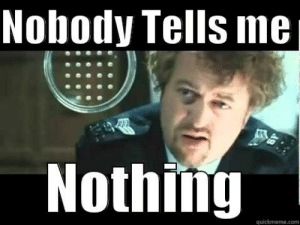
The Tyranny of Faith
This is now done, as in, completely done. Written, edited, copy-edited, proofread, done. So well on track to be released in February 2023 as per the original plan. The copy, which has been sitting on my Hachette Book Group portal for months now, has finally been pulled through to Goodreads for all and sundry to read. I think it's really cool! (I didn't write it):
A Justice's work is never done.
The Battle of Galen's Vale is over, but the war for the Empire's future has just begun. Concerned by rumors that the Magistratum's authority is waning, Sir Konrad Vonvalt returns to Sova to find the capital city gripped by intrigue and whispers of rebellion. In the Senate, patricians speak openly against the Emperor, while fanatics preach holy vengeance on the streets.
Yet facing down these threats to the throne will have to wait, for the Emperor's grandson has been kidnapped - and Vonvalt is charged with rescuing the missing prince. His quest will lead him - and his allies Helena, Bressinger and Sir Radomir - to the southern frontier, where they will once again face the puritanical fury of Bartholomew Claver and his templar knights - and a dark power far more terrifying than they could have imagined.
"Richard Swan's sophisticated take on the fantasy genre will leave readers hungry for more." - Sebastien de Castell on The Justice of Kings
"A fantastic debut." - Peter McLean on The Justice of Kings
No sign of the cover yet, I have seen a few mockups which look great - another background statue type thing, this time with Helena on the front - but not sure what the timelines are for the big reveal!
Empire of the Wolf 3
First draft of this is done and my beta readers (at least, those who have managed to get to it) have read it. I'm now doing my edit and I'm about 12% of the way through that. I've given myself until the end of the year to finish this but the reality is I'll probably need about 8 weeks. When I finished it I was feeling pessimistic (a pretty standard part of the novel writing cycle for me) but having had about 3 weeks away from it and now reviewing with fresh eyes, I'm actually pretty happy with it (another pretty standard part of the novel writing cycle for me).
Other projects
In the 3 weeks I took off after the end of drafting EOTW3 I got about 40k words down on a political space opera I've been planning for a number of years now. I'm very excited about this project; it's a book I've wanted to write for ages, all about nation-building, diplomacy, warfare, and what it means to be a democracy in a galaxy dominated by an enormous totalitarian regime. At the moment it's taking a backseat to Empire of the Wolf edits (as Empire of the Wolf pays the bills) but I'm hoping that this one will one day see the light of day.
Separately I have pitched to Orbit a standalone trilogy set several centuries after Justice of Kings. It's still the Empire of the Wolf, but in time more analogous to the French and Indian Wars of the mid 18th Century. Unfortunately I'm unlikely to hear anything back on that until after The Tyranny of Faith is published!
Fantasy Fellowship Con
I'm thrilled to be a part of this. My Empire of the Wolf Q&A will be taking place at 11am BST this coming Sunday. Tickets for the event can be purchased from the Fantasy Fellowship website here: https://fantasy-fellowship.co.uk/con2...

That's all for now!
Best
Rich
September 3, 2022
Signed / Personalised Copies of Justice of Kings now Available for Sale
If you are interested in purchasing a signed / stamped / otherwise customised copy of The Justice of Kings (and other Empire of the Wolf novels when they are released), you can head over to the "shop" section of my website for more details.
Thanks
Rich
July 19, 2022
Empire of the Wolf: Progress Update 20/07
The Justice of Kings
This will be available in mass-market paperback in late August, for those of you who cannot abide the hardbacks or the big floppy trade paperbacks which are very popular here in Australia and New Zealand. Nothing more to report on this one except that the option (as in, the film and tv rights) which was purchased 18 months ago, is up for renewal this month. Some cool and interesting things happening in that sphere, but I'm not holding my breath (and nor should you).
The Tyranny of Faith
Empire of the Wolf 2 officially has a title! The Tyranny of Faith came back from the proof-reader on Monday and I have until 3 August to have one last run through it, which will be my last chance to make any (extremely) minor amendments. From that point on it is completely locked down for typesetting, and I should imagine the first proofs/ARCs will be shipping out about a month or two later (don’t quote me on that though, that’s a timescale I have basically made up).
I am extremely happy with The Tyranny of Faith; I really can’t wait to get it into the hands of readers. The current release date is slated for early February 2023.
Empire of the Wolf 3
This definitely does not have a title and won’t for some time. However, the first draft progresses very well. As of this morning I broke 120,000 words; I am really getting the words in now, and I expect to complete the first draft by the end of August. I'm not contractually obliged to turn it in until 1 March 2023, but the reality is it'll be done and dusted well before then.
A Reputation for Prudence – Grimdark Magazine issue 31
I have a short story about the exploits of Sir Konrad Vonvalt, which is set ten years before the events of the Justice of Kings, in the latest issue of GDM. I think it’s a really cool little short story and it is chock-full of Easter eggs for books 2 and 3 in the Empire of the Wolf Trilogy. There's some other really cool stuff in that magazine as well, including other short fiction and articles— well worth the couple of quid it costs. You can download a copy here:
https://www.grimdarkmagazine.com/grimdark-magazine-issue-31-is-here/
Nothing else worth reporting on, so I'll leave it there for now.
Cheers
Rich
May 22, 2022
What is The Art of War Trilogy? A Note on my Self-Pubbed Work
Hello!
If you are reading this, you have most likely read or heard of The Justice of Kings, my debut fantasy novel from Orbit books. Which is great! You might have even seen my Goodreads page or my Amazon author profile and noticed a bunch of random sci-fi novels on there too.
What are those books, you wonder? Are they the product of some erroneous concatenation of two profiles, me and that of another sci-fi author called Richard Swan?
No!
The Art of War trilogy was indeed written by me, and self-published by me between 2015 and 2016. Knowing that those who enjoyed The Justice of Kings might be interested to see what else I had produced, I thought I would write this post to explain precisely what the Art of War trilogy is and where it came from.
I have said a number of times before in interviews that I have been writing since my early teens, and for a very long time it was normal for me to turn out a book a year. I did this until my final year of university, and then I took a break from writing. I had written so much in the previous ten years (especially in the previous three; like, a shit-ton of Black Library fanfic on the [now long gone] official forums) that I was feeling a little bit burned out. I was also entering the heady world of corporate London, which monopolised my time and brainpower and left little room for the fairly cerebral hobby of novel writing. As a result, I had a writing hiatus of perhaps two or three years.
In about 2013, the itch to write was back, and I picked up an abortive attempt at a manuscript I had started a few years before, re-read it, brought myself up to speed, and continued to chip away at it until it was complete. This manuscript would eventually become “Reclamation”—replete with loads of epigraphs from Sun Tzu’s the Art of War.
At around the same time I had just found out about Kindle Direct Publishing, a way to self-publish that wasn’t a vanity press. I don’t think KDP was particularly old at the time — in fact a quick Google search tells me it was started in 2007. I could see that some authors had really got in at the ground floor and were flourishing, in a time when the algorithm didn’t seem to distinguish books by published and self-published (in other words, self-published titles appeared next to traditionally published titles, rather than being algorithmically ringfenced).
Buoyed by this, I wrote the rest of Reclamation. It was in many ways the book I had always wanted to write; a proper space opera in the vein of Tiberian Sun / Mass Effect / StarCraft / Halo / Star Wars: Attack of the Clones (my biggest sci-fi influences outside of sci-fi literature), with English-speaking humanoid aliens, political manoeuvrings, diplomacy, espionage, and proper high-tech ultra-ballistic action sequences. I wanted to combine the pulp aspect of aliens as written by say, C.J. Cherryh in her Chanur Saga, but within an at least moderately scientifically-plausible universe (it is science fiction, not science fantasy). Indeed, it was seeing a picture of Mike Whelan’s Chanur’s Homecoming (easily, to my mind, the best science-fiction book cover in existence) that was the spark that began Reclamation.
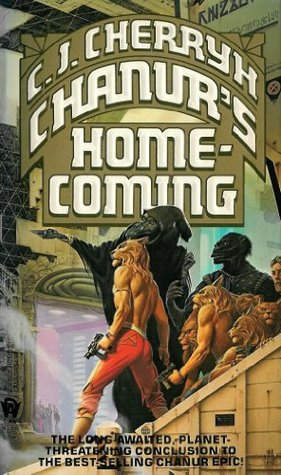
In writing Reclamation, I had been heavily influenced by Iain M. Banks, in the sense that his Culture series tended to focus on the “Special Circumstances” division, itself allegorical of modern Western nations using increasingly underhanded and unlawful techniques to wage the War on Terror. Indeed, Reclamation was heavily influenced by the Global War on Terror in and of itself, it having formed a staple of the news cycle throughout my teens.
After Reclamation came The Ascendancy War, and then to cap off the trilogy, Empire of the Fallen. I also wrote a couple of spin-off military science-fiction novellas (the VIPER series), and a prequel to Reclamation, Hadan’s Reach. Collectively, I refer to this body of work as my “UN-iverse”, since the human empire is simply called the UN.
When The Justice of Kings was well on its way to becoming my debut traditionally published novel, and the fanfare was building around that, I was initially tempted to (and briefly did) remove the UN-iverse from publication. I was worried that people would read The Justice of Kings and then go back through my self-published work and find a bunch of old novels that weren’t up to scratch. Indeed, I started to go back through Reclamation with a view to editing it and bringing it up to spec (and did edit the first chapter also, as well as remove the more egregious sex scenes(!)); but, by and large, I was actually pleased with it. In fact, I don’t personally think it’s any worse-in terms of quality of prose-than The Justice of Kings; the biggest difference is that my self-published work has had no editorial oversight. I hired a freelance proof-reader, but that was it, and I suspect it may be a little uneven as a result.
You might wonder why I chose to self-publish it in the first place. In fact I didn’t even think to try and get it traditionally published. I didn’t think the market wanted another space opera (this opinion was based on the single rejection I had received from Orbit when I was 15 for a very bad novel I had submitted to their slush pile). Besides, I was consumed by the excitement of having complete creative control over something, especially the cover art commission process—though I did end up licensing an older John Harris illustration in the end:
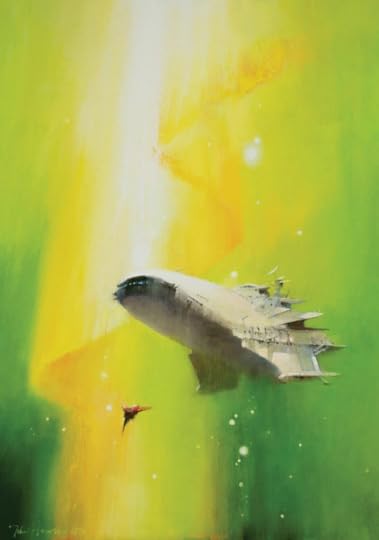
I released Reclamation in around 2015 to very little fanfare. I was a million miles away from the top indie self-publishers of today, around whom has grown an entire cottage industry of editors and cover artists, and who turn out work of remarkable quality. I never had the time or patience to put in the huge marketing efforts that self-published titles require to flourish—though I’m pleased to say that the books did do pretty well, notwithstanding. Eventually, though, per the laws of entropy, it all dried up into nothing.
You can only imagine my delight to see people unearthing the trilogy again thanks to the visibility that The Justice of Kings has brought me. I am extremely fond of those self-published titles. As some point I may find the energy and effort to do paperback copies, but for now they exist as e-books only.
So there you have it. That is the Art of War trilogy! If you do decide to pick them up, do leave a review or reach out to me to let me know what you thought!
Cheers
Rich
April 6, 2022
Empire of the Wolf: Progress Update 07/04
The Justice of Kings
The INSTANT SUNDAY TIMES BESTSELLING novel continues to be out there and available for purchase. Hardbacks for the lucky territories, big floppy trade paperbacks for Australia and New Zealand for some reason.
Empire of the Wolf 2
I turned in my edits today! For the nerds interesting in timings, I handed in the first draft of this on 14 January (2022, obviously), editorial comments came back on 26 February, and I completed those today, being 7 April. So the edits on my end took about 6 weeks.
So what did I do in those 6 weeks? A lot of fleshing out, mainly. The early draft, especially the first 1/3, was a bit too speedy. The manuscript is now 20k words heavier, for a total of just over 170k. I also did some more character work, dialling a few back, beefing a few up, and made the ending... just... MORE (that was literally what my editors said to do. "It's fine, just do MORE.") So it's more. And sadder.
Book 2 is due for copyedits no later than 16 May, so barring any catastrophes this should be well in-hand. It's also gone off to the cover artist, which is definitely the best and most exciting part of the process.
Empire of the Wolf 3
This has obviously been utterly neglected whilst I've been editing book 2, so it's still sitting at about 35k words. I'll need to change a few bits, too, to make sure it's in line with book 2. I'll pick this up again probably next week. I'm hoping that the first draft will be done in about 5 months.
Empire of the Wolf Short Story
I was recently invited by a well-known SFF publication to write an EOTW short story. This was great fun to write, just over 4k words, a self-contained dark tale about Vonvalt and Bressinger set 10 years before the events of The Justice of Kings. Don't know what, if anything, will happen with this, as I'm yet to hear back from the editor, but if it's successful I will definitely do more short stories / novellas in the coming months and years.
That's it for now!
Rich
February 17, 2022
Empire of the Wolf: Progress Update
Just a quick update as to where things stand on the Empire of the Wolf trilogy for those perennial will-he-finish-the-series? worriers:
Book 1 - obviously this is about to be released to the masses. The official release dates are 22 Feb USA, 24 Feb UK, with other countries falling somewhere on or between that spectrum; that said, I'm aware that people are already starting to receive their copies so these dates seem to have become at least partially meaningless
Book 2 - the first draft (about 150,000 words) of this is currently with James and Bradley, my UK and US editors respectively. I submitted it about a month or so ago. Nothing to do on this until I get it back; I'm told this will be around the end of February.
Book 3 - whilst book 2 is being edited, I have made a start on book 3. Currently this is around 35,000 words. I normally aim for my novels to be about 130-150,000 words. I suspect this one will be longer as book 3s tend to be, but I'm trying to keep a fairly tight grip on it.
I'm currently expecting that books 2 and 3 will be completely finished this year.
And... that's it! That's the update.
January 25, 2022
The Book of Koli by Mike Carey - Review
Take a pinch of A Canticle for Liebowitz, a big old glug of Riddley Walker, a dash of The Road, and a smidgen of The Book of the New Sun, and you have the Book of Koli.
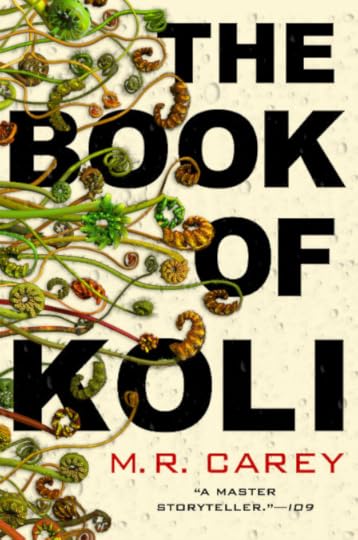
I really enjoyed this book. It’s the third Mike Carey book I’ve read, the other two being The Devil You Know (the Felix Castor novel) and, of course, The Girl with all the Gifts.
The Book of Koli is one of those post-apocalyptic books that’s set so far in the future we’ve reverted to a subsistence medieval society. Much like Riddley Walker, the book is written from the first person perspective of (in this case) Koli, a young lad in the novel (though an older man narrating the events). The first half of the book is Koli’s life in a small walled village called Mythen Rood; the second half of the book is his life outside of it (with a bit in the middle of how and why that transition came to happen).
The conceit of this novel is that every living thing beyond the walls of the village is out to kill everybody inside it; the trees, the plants, the animals—all have a visceral and uncontrollable hatred of humans and will stop at nothing to wipe the small number of remaining humans off the face of the earth. As to why this has happened, this is explained in the book itself (and I shall not spoil it).
Koli is a very capably told and taut story (and we would expect nothing less from Mike Carey!). There is nothing out of place here. The book rips along, the narrative develops, trials and tribulations occur. This is a book that luxuriates in its setting; you know Koli lives, since he is telling the story from the future, and so much of the mystery is wrapped up in how the world came to be the way it is (and this is revealed through delightfully naïve and misunderstood in-world references to the past) and how Koli gets into--and then out of--the various scrapes that form the meat of the novel.
This was an easy and effortless read, and therefore I suspect a difficult book to write. An easy five stars from me.
November 2, 2021
Perdido Street Station, by China Mieville - Review
I’m embarrassingly new to Bas Lag. I’m no stranger to Mieville’s works — Embassytown remains one of the best science fiction novels I’ve ever read — but there was something so offputtingly huge to me about the first Bas Lag outing, Perdido Street Station.
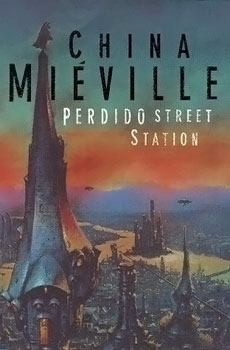
I haven’t really gone in for massive books (in this case, a solid 860 pages) for a long time. It’s not the length in and of itself that puts me off—though if there is one thing I have found, it’s that books of that length rarely need to be that length — it’s that I’m a slow reader. It took me six weeks to read this book. With limited reading time, and a finite number of books I can possibly hope to read in my lifetime, the opportunity cost of these longer books is often just too high a price to pay for me.
Anyway, with nothing on my radar and at a loose end in Bromley Waterstones, I decided to take punt on this. Well, it wasn’t really a punt, since I knew I loved Mieville’s writing; but I was running out of time, and I’m waiting on Claire North’s Notes from the Burning Age to hit paperback.
And this book was magnificent.
I really loved it. There’s no two ways about it.
How to describe it? It’s set in a place called New Crobuzon. New Crobuzon is as much character in the book as the actual characters. New Crobuzon is a mixture of something like:
Grimdark Ankh Morpork; A steam/powder punk version of London; The Dishonoured videogame universe.Mieville absolutely luxuriates in the setting he has created. The book is completely shot through with geographical references (which often mean nothing to the reader), descriptions of streets and buildings and rivers, and little vignettes of backstory about suburbs and regions. The book is as much a Lonely Planet guide to New Crobuzon as it is a vehicle for its plot.
In fact, if I had one criticism of the book, it would be that; Mieville revels so much in the sandbox world he has created, stuffing it full of four five novels’ worth of ideas and plot threads, that the actual main storyline is somewhat buried amongst the sheer display of imagination. This was not problem, really, for me. I love little throwaway details; they are what give the story its verisimilitude. But I can definitely see how some readers would not enjoy it. The details are in overabundance, and the casualty of this is that a number of plot threads are built up only to be lost in the noise.
The plot itself centres around a group of misfits as they try and stop a menagerie of horrifying moth-like creatures as they feed on the conscious minds of the citizens of the city. These people are not heroes; they very much exist on a spectrum of ethical diversity. The story itself does not tie up particularly neatly, and the ending is decidedly bittersweet (with the needle tending toward bitter). There are many synopses available online, so I shall not add to the cosmic microwave background on that front.
Anyway, the reality is Mieville is one of those writers I am insanely jealous of. I will never match the man’s talent when it comes to prose. I die a little bit inside every time I read one of his books. I wish I had something approaching his wordsmithery. I don’t really do star ratings any more, but if I did this one would have all of them. I am so very pleased that there are more Bas Lag novels out there.
I wish Mieville was more prolific.
I shall have to ration them…
September 24, 2021
The Death of Grass, by John Christopher: Review
I first came across this book a little while ago. It looked like a nice, short, self-contained piece of fiction, written in the 1950s at what must have been - if not the height, then certainly approaching it - of nuclear Cold War fever. It is also set in England, which is fairly rare amongst post-apocalyptic fiction - at least, the books that I have read.
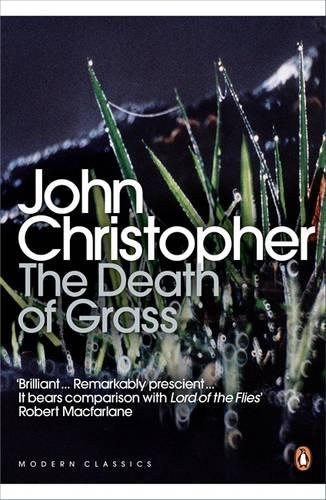
I am definitely a fair weather post-apocalyptic fiction reader. I have not read that many, and those that I have read tend to be the most popular releases. Certainly books that I can call to mind are The Road, A Canticle for Leibowitz, and Station Eleven, as well as The Stand. Actually, let me look back at my Goodreads…
I see I’ve also given World War Z a go (which I didn’t really get on with); Philip K Dick’s The Game players of Titan; The Handmaid’s Tale (potentially dubiously genre-d here); and Nick Harkaway’s The Gone Away World (actually one of my favourite books). So perhaps I’ve read quite a few, actually. Oh yes, and I Am Legend. So, in fact, loads.
I was initially going to say that post-apocalyptic fiction seems to follow a fairly formulaic path, but in fact all of those books are wildly different, and each very good (for the most part, in my opinion). There is something enticing about reading about the collapse of society. You cannot help but wonder how you yourself would react – whether you would be a hard-nosed survivalist, killing your neighbours, former colleagues, and countrymen in order to survive, or whether you would be a more collaborative world-builder, cooperating with those people, sharing out scarce resources, et cetera.
I suppose the biggest factor in these two paths, and everything in between, is the nature of the apocalypse itself. A nuclear war is likely to simply kill everybody, irradiate the survivors and give them all manner of cancers, and slowly kill the earth in a nuclear winter. Conversely, a zombie virus outbreak could be much more easily and effectively contained than in every zombie movie ever made, and one can see a post-zombie society returning to normal within as little as a decade or two.
Anyway, the Death of Grass. This book is about a virus called the Chung-Li Virus that affects all types of grass. It originates in China, and kills off rice initially, before it mutates and spreads to other Western staples like cereal crops. The book spends about 50 pages introducing us to the characters and their comfortable, professional suburban lives in London, before the virus gets out of control, countries pull up the drawbridges everywhere, starvation becomes a frighteningly clear and present danger, and London is quarantined (and travel is banned more generally).
The main character, a man called John, and his family live in London, as well as the main character’s close friend, a man called Roger, who works for the government and so has the inside track on what is going on. John’s brother, David, a bit of a survivalist and pessimist, owns a potato farm in the rural north of England - remember potatoes are not affected by the virus - and has spent the last year or so fortifying his farm in anticipation of the impending apocalypse. Roger discovers, by virtue of his role as a civil servant, that the government has been lying about the severity of the situation in order to keep everybody calm – and in fact 30 million people are expected to starve to death.
“Damn it!' John said. 'This isn't China.' 'No,' Roger said. 'This is a country of fifty million people that imports nearly half its food requirements.' 'We might have to tighten our belts.' 'A tight belt,' said Roger, 'looks silly on a skeleton.”
Roger persuades John and their respective families, as well as a (as it turns out, sociopathic) local gun shop owner and his guns, to get out of London that evening before all of the roads are sealed off. They manage to just as the news breaks, and so begins their arduous and dangerous cross-country journey to David’s potato farm, where they plan to hole up and weather the storm. That journey, and the trials and tribulations that accompany it, takes up the remainder of the page count.
The Death of Grass is not a long book. It’s about 200 pages, though the text is small. It’s a fantastic idea, and if the book were to be written today, in a more modern style, I daresay it would be much more visceral, haunting, and cinematic in scope. As it is, the prose is quite staid. That’s not to say it’s bad by any stretch, just that it’s a victim of the writing style of the 1950s, which to my mind, can be quite slow, formal, and not quite as exciting and dramatic as we would expect as modern readers.
And that isn’t to say that exciting and dramatic things do not happen; there is plenty of killing and murder in this book, as well as rape and sexual assault, and allusions to both of those things. It’s just that the prose robs these events of the sense of urgency and horror that we would naturally expect. It’s the difference between watching a black and white movie from the 1950s, and Se7en. And it isn’t appropriate to criticise the book for this; that was simply the writing style of the time. It just makes for a slightly jarring, sanitised read, given the subject matter.
The book explores some great themes. I did very much like the characters’ arrogance; that they thought that being good, British, Westerners, with stiff upper lips and a good grip on themselves and their emotions, set them above the (what they considered to be) easily-excitable and frightened Chinese and other Asians. The characters are at lengths in the first quarter of the book to point out that although the situation in Asia is desperate – with mass riots, mob violence, cannibalism, and all the other horrible things that go along with the complete collapse of society – they simply don’t think that British people are capable of such barbarism, and that they will whether the storm in a much better and more orderly fashion. So it is gratifying to then see that, when the rubber meets the road, the characters and their fellow countrymen are quick to murder, rape and loot.
This does, however, give rise to my second main criticism of the book. My difficulty is not that the murder, rape and loot happens - I can absolutely see this happening; rather, it is how quickly this happens. John is a mild-mannered architect from London, a family man, as juxtaposed by his more rambunctious friend Roger. However, it is John who - within a space of literally a day - becomes a cold-blooded murderer, killing without compunction, including people who are unarmed. He approaches this grim task with such level-headed detachment, matter-of-factly explaining to his horrified wife that it’s now kill or be killed, that you find yourself reading the book with an eyebrow cocked. Again, I don’t doubt that, in such a situation, people would resort to extreme measures. But killing somebody else is an extremely difficult thing to do in any circumstances; soldiers on the battlefield struggle with it, and have nightmares about it for years afterwards. I think it should have taken John a bit more than a day or two to get there.
The Death of Grass is rightly considered a classic, and I did enjoy and rip through it. I can imagine that it was an extremely disturbing read at the time of its first publication in the same way War of the Worlds was, and it is a surprisingly and unremittingly bleak book. Modern readers will probably find its presentation a bit tame, in spite of the subject matter, but that is not to say that it has not earned its place amongst the pantheon of post-apocalyptic fiction.



